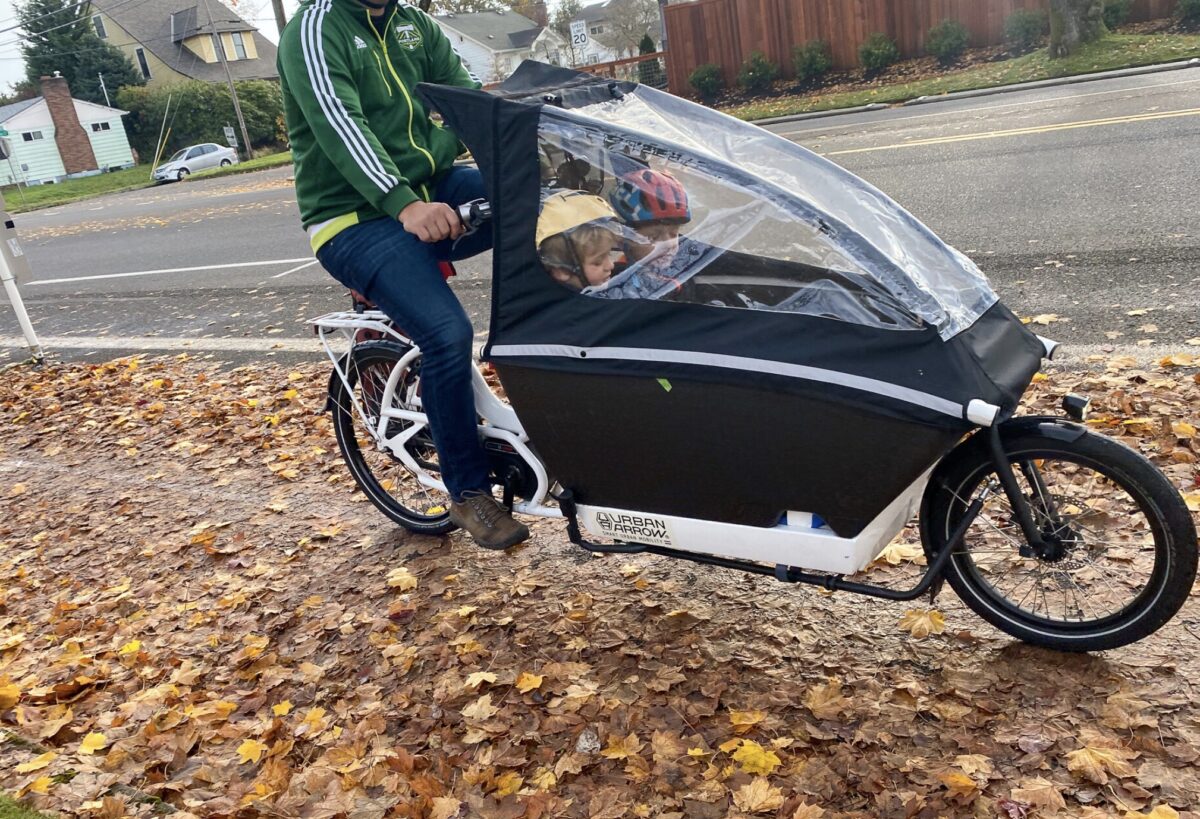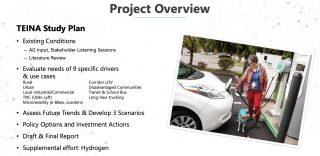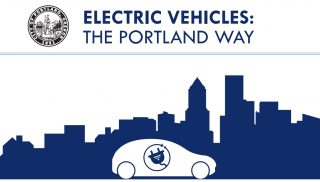
(Photo: Jonathan Maus/BikePortland)
As electric bikes continue to win over fans in Portland and beyond, the need for public charging locations will increase. As we shared in a guest post yesterday, one of the conundrums facing e-bike users is that having a motor on their bike increases the range of destinations, but it can also increase anxiety about not making it home on one charge.

“Range anxiety” was a hot term when it was coined 10 years ago, and until now it referred almost exclusively to electric cars. With e-bikes getting yet another boost in popularity due to the pandemic, it’s time for transportation agencies to put them on equal footing with cars when it comes to electrification initiatives.
On November 17th the Oregon Department of Transportation hosted the first meeting of the Transportation Electrification Infrastructure Needs Analysis (TEINA) Advisory Group. The TEINA was spurred by Oregon Governor Brown’s executive order on “climate action” that called on state agencies to reduce greenhouse gas emissions. It’s being run by the ODOT Climate Office in partnership with the Oregon Department of Energy. The effort will, “Highlight gaps in electrical vehicle charging infrastructure and propose solutions to help accelerate widespread transportation electrification in Oregon.”
Advertisement

We’ve seen these efforts before and have long been concerned that they minimize or completely overlook electric bicycles. In 2010 the City of Portland published a report that laid out a strategy to encourage electric vehicle use. Unfortunately it made no mention of bicycles. Portland’s 2015 Climate Action Plan also failed to make the connection between e-bikes and the need for bike-specific charging stations. Among the action-items the plan aimed to complete by 2020 was to, “support use of electric bikes.” But a separate action in the plan called on the city to “expand and support electric car charging stations in publicly accessible locations.”
The City of Portland and the State of Oregon cannot afford to overlook bikes in these efforts this, and we can’t assume they’ll keep e-bikes in mind. Even bike-minding planners at the newly-opened Gateway Green Bike Park didn’t have the issue on their radar.
At first glance, it looks like ODOT will include bikes in the conversation. “Convenient, accessible charging infrastructure is a critical driver in accelerating the widespread adoption of electric vehicles (EVs) and other types of electric transportation (such as electric buses, delivery vans, freight trucks and e-bikes),” reads the TEINA website (not sure why they put e-bikes in a separate category from EVs, since bicycles are considered vehicles in Oregon law, but I digress). Another passage reads, “Provide a near-term and long-term high-level overview of the charging infrastructure needs for other vehicle classes and use types, ranging from medium and heavy-duty trucks and buses to e-bikes and e-scooters.”
Advertisement

But a closer look at the TEINA advisory group membership and other documents on the website give reasons for concern.
No one on the 17-member advisory group represents bicycles, e-bikes are lumped into the micro-mobility category with e-scooters (no offense to scooters), and the “project overview” says the study will, “Evaluate needs of 9 specific drivers & use cases.”
Asked about the makeup of the advisory group, an ODOT spokesperson said there was no application process and that members were chosen by project leaders. Among those chosen are the leader of driving advocacy group AAA, the public policy manager for General Motors, consultants, and reps from cities, counties, and energy companies.
The engagement plan for the study will include the advisory group and 11 “listening sessions” with various user groups. Those sessions will be focused on transit users, farmers, real estate developers, freight interests, and micro-mobility — where we’d expect e-bikes to be discussed.
We should not be hoping e-bikes get their due in these planning processes. Given that e-bikes can unlock huge benefits to urban, suburban, and rural Oregonians and offer better ROI than perhaps any other form of transportation (besides analog bikes), they should be front-and-center.
If you want to track this initiative, check out the TEINA website. They have three more meetings planned between now and May 2021 when they plan to complete the draft report. For a great resource on all things EV in Oregon, check out GoElectric.Oregon.gov.
— Jonathan Maus: (503) 706-8804, @jonathan_maus on Twitter and jonathan@bikeportland.org
— Get our headlines delivered to your inbox.
— Support this independent community media outlet with a one-time contribution or monthly subscription.


